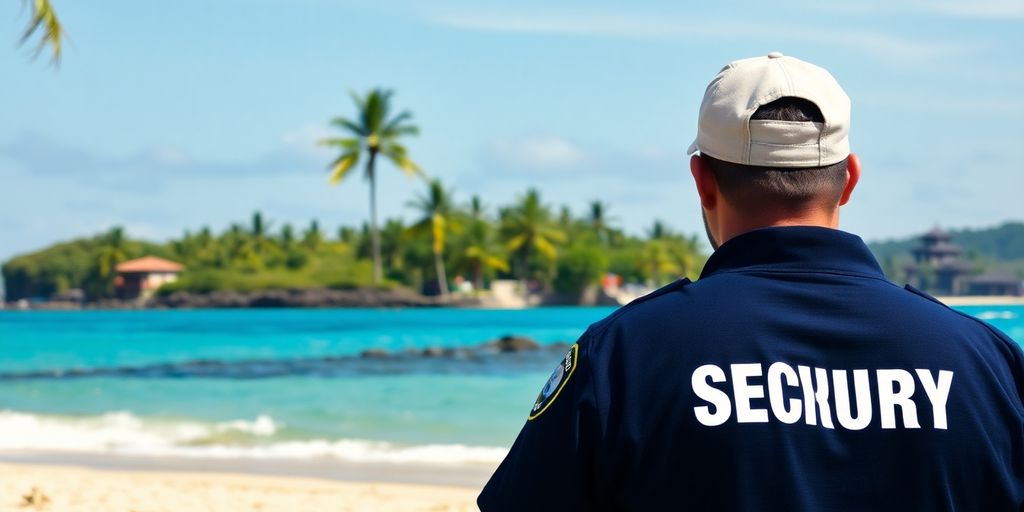Traveling to Bali can be a fantastic experience, but it’s crucial to keep your personal security in mind. As an international traveler, understanding the local risks and knowing how to stay safe is key to enjoying your trip. This guide provides essential tips and insights to help you navigate Bali safely, ensuring that your adventure is both enjoyable and secure.
Key Takeaways
- Stay aware of your surroundings, especially in crowded areas.
- Use reputable transportation options to avoid scams.
- Always keep your belongings secure to prevent theft.
- Respect local customs and dress appropriately while in Bali.
- Have emergency contacts handy, including local authorities and your embassy.
Understanding Personal Security Risks in Bali
Bali is generally a safe place, but it’s smart to be aware of potential problems. It’s not about scaring you, but about helping you have a great trip without any nasty surprises. Let’s look at some common security risks.
Common Crime Types
Petty theft is probably the most common issue tourists face. Pickpocketing and bag snatching happen, especially in crowded areas. It’s the same as any popular tourist spot around the world, really. Keep an eye on your stuff, especially your phone and wallet. Don’t leave valuables unattended on the beach while you go for a swim. Scooter theft can also be a problem, so make sure your rental is properly secured. Also, be careful in Kuta, especially with mobile phones.
Scams Targeting Tourists
Bali is a tourist hotspot, so naturally, there are scams. Some common ones include inflated prices for goods and services, fake ATMs that steal your card info, and taxi drivers who take you the long way to run up the fare. Always use ATMs located at banks. Be wary of overly friendly strangers offering help, as they might have ulterior motives. Research common scams before you go, so you know what to look out for. You can check out tourist scams to protect yourself.
It’s a good idea to negotiate prices before agreeing to anything, whether it’s a taxi ride or a souvenir purchase. If something feels off, trust your gut and walk away. Don’t be afraid to say no.
Safety Concerns for Solo Travelers
Traveling alone can be amazing, but it also means you need to be extra careful. Women traveling solo sometimes report sexual harassment. It’s a sad reality, but being aware can help you avoid problems. Stick to well-lit and populated areas, especially at night. Let someone know your plans and check in regularly. Consider using ride-sharing apps instead of hailing random taxis. Also, be aware of Indonesia’s laws and social beliefs, especially if traveling alone.
Here are some extra precautions for solo female travelers:
- Consider bringing a door stopper or lock for your accommodation.
- Carry a whistle to attract attention if needed.
- Budget for more upscale lodging and transport options.
Essential Safety Tips for International Clients
Avoiding Pickpocketing
Okay, so pickpockets are a thing pretty much everywhere, but Bali has its share. The key is to make yourself a less appealing target. Don’t flash a ton of cash, and keep your wallet in your front pocket or a zipped bag. Ladies, a cross-body bag worn in front is way safer than a shoulder bag. I’ve seen people get their bags snatched right off their chairs in cafes, so never leave your stuff unattended, even for a second.
- Use a money belt or hidden pouch for large sums of money.
- Be extra careful in crowded markets and tourist hotspots.
- Consider using a dummy wallet with a small amount of cash to hand over if confronted.
Staying Aware in Crowded Areas
Crowds are a pickpocket’s playground, but they can also be risky for other reasons. Keep your wits about you, especially during festivals or at popular attractions. It’s easy to get disoriented, and that’s when accidents happen. Agree on a meeting point with your travel buddies in case you get separated. Also, be mindful of your belongings; keep your phone and camera secure. I always try to stand with my back against a wall or something solid, so no one can sneak up behind me.
- Stay alert and observe your surroundings.
- Keep valuables out of sight.
- Trust your instincts; if a situation feels off, remove yourself from it.
Using Reliable Transportation
Getting around Bali can be an adventure, but it’s important to choose your transport wisely. Official taxis with meters are generally safe, but always make sure they actually use the meter! Ride-hailing apps like Gojek and Grab are super popular and usually pretty reliable, but double-check the driver’s rating and license plate before you get in. Avoid unmarked taxis or drivers who approach you offering rides; they might overcharge you or worse. If you’re renting a scooter, make sure you have a valid international driver’s license and wear a helmet. The roads can be chaotic, and accidents are common. Also, make sure you have travel health insurance with worldwide coverage.
I once hopped into what I thought was a regular taxi, and the driver tried to charge me five times the normal fare. I refused to pay and got out, but it was a hassle. Now, I only use ride-hailing apps or pre-booked transportation.
- Use reputable taxi companies or ride-hailing apps.
- Negotiate the fare beforehand if the taxi doesn’t have a meter.
- Inspect rental vehicles for damage before driving off.
Navigating Bali’s Nightlife Safely

Bali’s nightlife is a big draw for many tourists, but it’s important to approach it with caution and awareness. It’s easy to get caught up in the excitement, but staying safe should always be the top priority. From choosing the right venues to being mindful of your alcohol consumption, there are several things you can do to ensure a fun and secure night out.
Choosing Safe Venues
Not all clubs and bars are created equal. Some establishments have better security measures and a more responsible atmosphere than others. Do some research beforehand and read reviews to get a sense of the venue’s reputation. Look for places that have visible security personnel, well-lit areas, and a good track record of handling incidents responsibly.
- Stick to well-known and reputable establishments.
- Avoid venues that seem overly crowded or chaotic.
- Check for emergency exits and make sure they are clearly marked and accessible.
Avoiding Excessive Alcohol Consumption
It’s easy to overindulge when you’re on vacation, but excessive alcohol consumption can impair your judgment and make you more vulnerable to scams, theft, and other dangers. Know your limits and stick to them. Pace yourself, drink plenty of water, and don’t feel pressured to keep up with others.
It’s a good idea to set a drink limit for yourself before you even head out. This helps you stay in control and make better decisions throughout the night. Also, be wary of accepting drinks from strangers, as they could be spiked with something.
Traveling in Groups
There’s safety in numbers, especially when exploring Bali’s nightlife. Stick with your friends and look out for each other. If someone in your group needs to leave early or go somewhere else, make sure they have a safe way to get there. Partying in Bali is more fun when you know your friends have your back.
- Designate a buddy system to ensure everyone stays together.
- Plan your transportation in advance, especially for getting back to your accommodation.
- If someone in your group is feeling unwell or uncomfortable, leave the venue immediately.
Health and Safety Precautions
Bali is awesome, but let’s be real, staying healthy and safe needs to be a priority. It’s not just about avoiding sunburn; there are a few things you should keep in mind to make sure your trip is memorable for the right reasons.
Staying Hydrated and Sun Safe
Okay, this might sound obvious, but seriously, Bali’s sun is intense. You’ll be sweating more than you think, so water is your best friend. And don’t even think about skipping the sunscreen. Reapply often, especially after swimming. A hat and sunglasses are also a must. Dehydration and sunburn can ruin your vacation faster than you can say "Bintang."
- Drink plenty of bottled water throughout the day.
- Apply high SPF sunscreen liberally and frequently.
- Wear a hat and sunglasses to protect yourself from the sun.
It’s easy to get caught up in the fun and forget about these basic precautions, but trust me, your body will thank you for it. Heatstroke is no joke, and neither is skin cancer. A little bit of prevention goes a long way.
Dealing with Local Wildlife
Bali has some amazing wildlife, but not all of it is friendly. Monkeys can be cute, but they’re also notorious for stealing things, and sometimes they bite. Stray dogs are common, and while many are harmless, some can be aggressive or carry diseases. Be cautious around animals, and definitely don’t feed them. If you get bitten or scratched, seek medical attention immediately. Also, watch out for mosquitos, especially at dawn and dusk. They can transmit diseases like dengue fever. Use mosquito repellent and wear long sleeves and pants when possible. You might want to consider travel insurance for peace of mind.
- Avoid direct contact with monkeys and other wild animals.
- Use mosquito repellent regularly.
- Seek medical attention for any animal bites or scratches.
Emergency Medical Services
Hopefully, you won’t need it, but knowing how to access medical care is important. Bali has hospitals and clinics, but the quality can vary. If you have a serious medical issue, you might want to consider being evacuated to Singapore or Australia. Make sure your travel insurance covers medical evacuation. Familiarize yourself with the location of the nearest hospital or clinic to your accommodation. Keep a list of emergency numbers handy, including the local ambulance service. It’s also a good idea to learn a few basic Indonesian phrases to help you communicate in an emergency. Here’s a quick reference:
| Service | Number |
|---|---|
| Police | 110 |
| Ambulance | 118 |
| Fire Department | 113 |
Having access to reliable medical care is non-negotiable. Don’t assume that you can just wing it if something goes wrong. Plan ahead, get the right insurance, and know where to go if you need help. It could save your life.
Cultural Sensitivity and Respect
It’s easy to get caught up in vacation mode, but remembering that you’re a guest in Bali is super important. Showing respect for the local culture will not only enrich your experience but also help you avoid unintentional offense.
Understanding Local Customs
Balinese culture is rich and deeply rooted in Hinduism. Religious ceremonies are a common sight, and it’s important to be mindful and respectful during these events. Avoid interrupting or getting in the way of processions or rituals. When entering a temple or someone’s home, it’s customary to remove your shoes. Public displays of affection beyond holding hands are generally frowned upon. A simple smile and polite demeanor go a long way in building positive interactions with locals. It’s also considered disrespectful to point with your index finger or touch someone’s head. Understanding these basic customs can significantly enhance your interactions and show that you value their traditions. If you want to witness and be a part of Bali’s culture, consider visiting during a local festival or celebration, such as the Bali Arts Festival, Bali Kite Festival, Saraswati Day, or Nyepi Eve.
Dress Code Considerations
When visiting temples or other sacred sites, dressing modestly is essential. This generally means covering your shoulders and knees. If you’re not appropriately dressed, you can usually rent a sarong and sash at the entrance. In public areas, casual wear is acceptable, but it’s still a good idea to avoid overly revealing clothing. Bikinis and swimwear are best reserved for the beach or pool. Being mindful of your attire shows respect for the local culture and avoids causing offense.
Interacting with Locals
Balinese people are known for their warmth and hospitality. Approaching interactions with kindness and respect will be greatly appreciated. Learning a few basic Indonesian phrases, like "Terima kasih" (thank you), can also make a positive impression. Be patient and understanding, especially in situations where there may be language barriers. Avoid arguing or raising your voice, as this is considered impolite. Remember that you are a guest in their home, and treating locals with courtesy and consideration will contribute to a more enjoyable and meaningful experience. It’s important to support the tourism industry while respecting the local culture.
Remember, a little effort to understand and respect Balinese customs can go a long way in creating positive interactions and a more enriching travel experience. Being mindful of your behavior and attire shows that you value their culture and traditions.
Emergency Contacts and Resources
It’s super important to know who to call if something goes wrong. Having quick access to the right numbers can really make a difference in an emergency. Let’s break down the essential contacts you should have handy while you’re in Bali.
Local Authorities and Emergency Numbers
Knowing the local emergency numbers is key. You don’t want to be scrambling when every second counts. Here’s a quick rundown:
- Police: 110 or 112
- Fire: 113
- Ambulance/Rescue: 118 or 119
- Search and Rescue: 115
- SMS Assistance: 1717
Keep these numbers stored in your phone and maybe even written down somewhere, just in case your phone isn’t working. It’s better to be over-prepared than caught off guard.
It’s also a good idea to familiarize yourself with the local emergency phone procedures. Knowing how to report an incident clearly and concisely can help the authorities respond more effectively.
Tourist Assistance Centers
Tourist Assistance Centers are there to help with all sorts of issues, from lost passports to dealing with scams. They can provide guidance, translation services, and connect you with the right resources. These centers are usually located in popular tourist areas, so keep an eye out for them. They can be a real lifesaver if you’re facing a problem you can’t handle on your own.
Embassy Contacts
Your embassy is your go-to for serious problems, like if you lose your passport, get arrested, or need help with a major medical issue. Make sure you know where your embassy or consulate is located and how to contact them. It’s also a good idea to register with your embassy before you travel; this way, they can reach you in case of an emergency back home or a crisis in Bali. Keep their contact information easily accessible – it could be the most important thing you pack.
Travel Insurance and Its Importance

Travel insurance? Yeah, it might seem like just another thing to add to your already long to-do list before jetting off to Bali. But trust me, it’s way more important than picking the perfect Instagram filter. Think of it as your safety net, your ‘oops-I-accidentally-rode-a-scooter-into-a-rice-paddy’ fund, and your ‘unexpected-volcano-eruption-stranded-me-at-the-airport’ backup plan all rolled into one. Seriously, don’t skip this step.
Choosing the Right Coverage
Okay, so you’re convinced you need travel insurance. Great! Now comes the fun part: wading through all the fine print. Not really fun, I know, but super important. You’ve got to make sure your policy actually covers the stuff you’re likely to encounter in Bali. Are you planning on surfing? Make sure your policy covers water sports. Hiking up a volcano? Check for adventure activity coverage. Just chilling by the pool? Still check everything! Here’s a few things to consider:
- Medical Coverage: This is a big one. Make sure it covers hospital visits, doctor’s fees, and any medication you might need. Evacuation coverage is also key, especially if you’re planning on going off the beaten path.
- Trip Interruption/Cancellation: What if you get sick before your trip and can’t go? Or what if there’s a family emergency and you need to cut your trip short? This coverage can help you recoup some of your non-refundable costs.
- Lost or Stolen Belongings: Luggage goes missing, phones get swiped – it happens. Make sure your policy covers the cost of replacing your stuff. Keep receipts and take photos of your valuables before you leave, just in case.
Understanding Policy Exclusions
Alright, let’s talk about the not-so-fun part: exclusions. These are the things your policy won’t cover, and it’s crucial to know them before you need to make a claim. Common exclusions include pre-existing medical conditions (unless specifically covered), injuries sustained while doing something reckless (like riding a scooter without a helmet), and losses due to civil unrest or natural disasters (though some policies offer coverage for these).
Read the fine print, people! I know it’s boring, but it could save you a ton of money and heartache down the road. Don’t assume anything is covered – always double-check.
Emergency Evacuation Considerations
Okay, let’s hope you never need this, but it’s good to be prepared. Emergency evacuation is basically getting you from Bali to a place where you can receive adequate medical care, whether that’s back home or to a nearby country with better facilities. This can be incredibly expensive, so it’s essential to have it covered in your travel insurance. Here’s what to think about:
- Coverage Amount: Make sure your policy has a high enough limit to cover the cost of a potential evacuation. These things can easily run into the tens of thousands of dollars.
- 24/7 Assistance: Look for a policy that offers 24/7 emergency assistance. You want to be able to call someone anytime, day or night, if you need help.
- Pre-Approval: Some policies require pre-approval for medical treatment or evacuation. Know the process and what you need to do to get the green light.
| Scenario | Potential Cost (USD) | Insurance Coverage Needed |
|---|---|---|
| Medical Evacuation | $20,000 – $100,000+ | High Limit |
| Hospital Stay | $500 – $5,000+ | Comprehensive Medical |
| Lost/Stolen Items | $100 – $1,000+ | Baggage Coverage |
So, yeah, travel insurance might seem like a drag, but it’s a small price to pay for peace of mind. Do your research, choose a policy that fits your needs, and then relax and enjoy your trip to Bali!
Stay Safe and Enjoy Your Trip
In the end, keeping yourself safe in Bali is all about being smart and aware. Sure, it’s a beautiful place with a lot to offer, but you’ve got to stay on your toes. Watch out for scams, keep your belongings close, and don’t hesitate to ask for help if you need it. Whether you’re lounging on the beach or exploring the markets, remember that a little caution goes a long way. So, enjoy your time in Bali, soak up the culture, and make some great memories, but always keep your safety in mind.
Frequently Asked Questions
Is Bali safe for tourists?
Yes, Bali is generally safe for visitors. However, you should be careful about scams and petty theft.
What should I do if I encounter a scam?
If you think you’ve been scammed, stay calm and report it to local authorities. It’s also good to inform your hotel.
How can I avoid pickpockets in Bali?
Keep your valuables close and use a money belt. Be especially careful in crowded places.
What are the emergency numbers in Bali?
For emergencies, you can call 112 for general help, 110 for police, and 119 for an ambulance.
Should I buy travel insurance for my trip?
Yes, travel insurance is important. It can help cover medical costs and other unexpected expenses.
What should I know about local wildlife?
Be cautious around stray dogs and monkeys, as they can carry diseases. Avoid feeding them.







